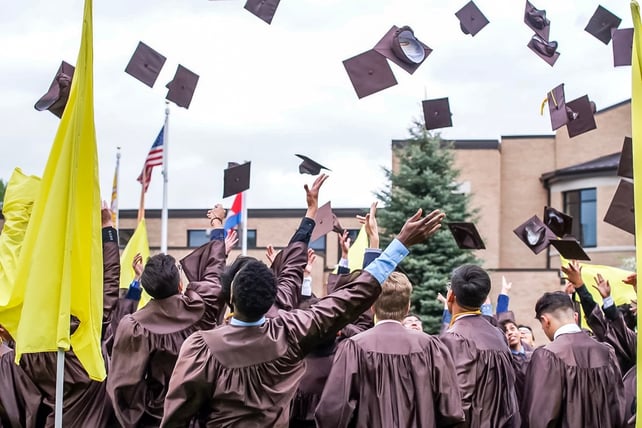
For parents, the conversation of where their child is going to attend college often begins at an early age, for some, as early as the elementary years. But for students, the college admissions process isn’t considered until the junior, even senior year, of high school. It can be extremely beneficial to start the conversation earlier in their high school years about applying to college.
Your son doesn’t need to know what career he wants or where he wants to attend college to begin this conversation. Read on for a few ways to start the conversation about applying to college, as well as steps to make the process easier.
Freshman Year of High School: A Time to Evaluate and Plan
Freshmen year isn’t too early to begin the conversation about preparing for higher education. This is the perfect time for students to begin building an academic and co-curricular resume that will impress future admission officers.
Students at this stage should consider what their academic schedule looks like and if they should enroll in college prep courses. Since many schools assign students to a specific counselor, students should seek out their help in asking questions and designing a plan on how to advance to college prep courses.
Focusing on achieving the strongest grades possible is important since many colleges cite this as one of the strongest indicators for enrollment. Experiencing an array of co-curricular involvement can also help students in the future, showing their willingness to get involved and make a difference in their school and communities.
If your son isn’t sure what he wants to do or what his interests are, freshmen year is also an excellent time for him to explore. Encourage him to sign up for a variety of different elective courses and extracurriculars. This can help him discover the subjects and activities he may be talented and passionate about.
Sophomore Year of High School: Continue the Hard Work
Sophomores should continue to build on their experiences from freshman year. It is important to stay involved in activities that truly interest them; these activities can help further develop their sense of self and teach them how to make an impact in their communities. This is also where, if they haven’t already, students should begin to consider what careers they are interested in pursuing and what colleges could help them best in those pursuits.
Students should speak to their school’s guidance counselor to target their areas for personal growth or what they can do to further prepare for college, including asking about any standardized testing, their course load, or other experiences that may improve their chances for college admittance.
At St. Lawrence Seminary High School, we match our underclassman with upperclassman in fraternities of 10-12 boys that are balanced on grade, culture and compatibility. This allows our freshmen and sophomore students a rare opportunity to hear firsthand from seniors and juniors as they prepare for their own college journeys. This helps underclassmen know what types of courses to take and how to prepare for college.
Junior Year of High School: A Serious Look at the Future
Much of the heavy lifting for college enrollment takes place during the junior year of high school. To begin, students need to consider their strengths, talents, and interests in order to know what career they might want to pursue. For those who are unsure of where their interests lie or how their interests translate to the workforce, now is the time to take an interest inventory to get a better sense of what career may best utilize their talents. They can meet with their school counselor to help create an interest inventory or to take skills assessment tests.
This is also the time for your student to decide what important qualities he wants in his future college. For example, is he interested in a large or small school, a rural or urban setting, a private or public university, a specific program or a liberal arts curriculum? Each of these answers will help your son narrow his search for schools that best fit his needs.
Beyond the self-assessments, junior year is typically where students take standardized tests. Depending on where a student would like to apply, he will likely need to take the ACT or SAT standardized tests. These tests allow schools to judge a student’s overall knowledge acquisition, but many colleges report that grades and other involvement weigh more in their decision-making process than the test scores alone. Preparing for these tests is important, but equally so is maintaining and improving grades. Additionally, a student should continue any extracurricular, sports or other activities, such as volunteer work. If your son hasn’t joined a group by this point, he should strongly consider finding something that piques his interests; colleges do look for applicants that have experiences outside the classroom.
When looking at colleges, junior year is an excellent time for students to speak with adults or alumni about their personal college experience. Students can learn what to expect in college and how to select the right colleges to apply to.
The summer between junior year and the start of senior year is the perfect time to complete college visits. Visiting a college campus can give students a feel for the campus, an opportunity to envision himself there, and a way to continue narrowing his selection. For those who can’t set foot on a physical campus, many schools offer virtual online tours, student and professor testimonial videos, and a plethora of information about the college. Your son should also consider how he will pay for college; he should complete the FAFSA and begin his search for scholarships.
Senior Year of High School: Not Finished Yet
Senior year brings many challenges and many opportunities. Now is the time for students to retake their standardized tests if they were dissatisfied with their previous scores. It is also the time to submit applications to their top choice schools and to at least one fallback school; the majority of high schools recommend, even require, students to apply to at least one top choice school and one fallback school. Even if a student doesn’t yet know what he wants to study, it is important for him to carefully consider all of the factors that will make him successful, including school size, programs available, location, faith affiliation, and more.
Applying to schools typically requires personal information, grade point average, coursework both completed and in progress, and teacher references. Having those items available before beginning applications can make the process easier. Most colleges require an application fee, so narrowing the number of schools one applies to is a cost-saving measure.
Keeping up one’s involvement and grades is still necessary, as schools reserve the right to withdraw offers of enrollment if there is significant change in a student’s senior year.
St. Lawrence Seminary High School: Prepared for Graduation and Beyond
At St. Lawrence Seminary High School (SLS), students complete many of these tasks through the help of our guidance counselor and our classroom teachers. The guidance counselor discusses options and opportunities with each sophomore, junior, and senior. Classroom teachers take time to discuss specific college-related questions and to encourage students in their progress toward choosing and applying to schools. Students can visit college campuses on weekends or do so with their families over a school break.
Juniors are registered for ACT test preparation to help reduce test anxiety. “College Day” events for juniors and seniors help them to identify steps to successfully apply for and gain admittance to college. All along the way, the counselor communicates with students their next steps and any needed documentation.
SLS staff are deeply committed to the success of each student so that they are well prepared for college.
The amount of time and work it takes to get into college can seem daunting, but the outcome and success of your son’s future is worth the effort. With diligence in coursework, community involvement, and paying attention to deadlines, students can successfully navigate the process. Don’t procrastinate! Start a conversation today about your student’s college future.
For more information about St. Lawrence Seminary and our college preparatory work, download our FREE Parent's Guide.
St. Lawrence Seminary is an all boys Catholic boarding school located in Mt. Calvary, Wisconsin. We welcome students from the Midwest, across the United States, and from around the globe. Inspired by the Gospel of Jesus Christ and the example of St. Francis of Assisi, St. Lawrence Seminary provides a residential college preparatory education in a living Catholic community nurturing mature, well-rounded men of faith. See if St. Lawrence is right for you and your son.



